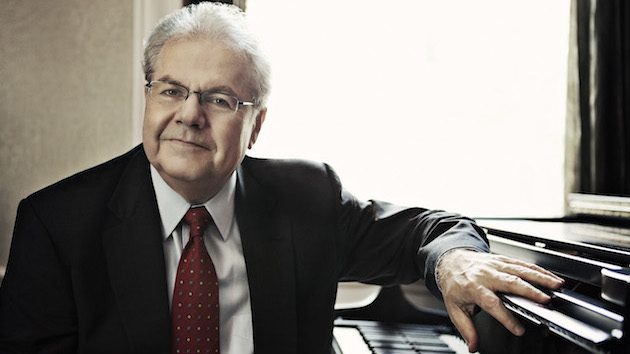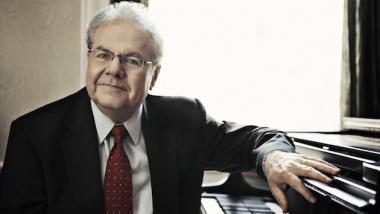
Emanuel Ax is notoriously nice — one of the kindest, funniest, genuinely caring people in the business. And, although he is 40 years into a career as one of the world’s greatest pianists, both as a soloist and a chamber musician, and although, at 65, he’s still inarguably at the top of his game, he maintains a completely genuine sense of modesty, humility, and respect for the hard work, and the great fun, of making music. He comes to San Francisco for two appearances this month, presented by San Francisco Symphony: a solo recital on Sunday January 11 and a special gala performance with the orchestra celebrating Michael Tilson Thomas’ birthday on the 15th.
Tell me a bit about your recital program — Rameau, Debussy, and Chopin.
I guess it’s kind of a French-y program. It all started with the Rameau, and then I added the Debussy Images because there’s a piece called “Hommage à Rameau” in there ... And then I guess the second half is inspired by the French side of Chopin. You know, he’s half French, so I thought it would be kind of nice to play the four Scherzos. So it’s a nice program, but unfortunately, it’s very hard. So I’m working and working and working and I hope it works out, you know? I hope the hands work.
Well, we always hope that, don’t we? Speaking of hard pieces: On your new Sony release, Variations you’ve recorded sets of variations by Haydn, Beethoven, Schumann, and Copland, and I read that the Schumann (the Symphonic Etudes) are new for you. That’s a big piece to add to your repertoire.
The Schumann I’m very proud of, because I only learned it about four or five years ago. I started practicing it really hard, and I practiced and practiced for a couple of years, and then I recorded it, and now I never have to practice it again!
Right, that’s the beauty of recording something — you never have to play it again if you don’t want to.
So, I’m fine with that. I think I may have to give up on it. It’s so, so difficult. But I was very happy that I managed to do it, you know? It was really a victory for me.
So, at this point in your career, what does it mean to you to learn a new piece? Are you ever learning new pieces because you have to, for a specific commitment, or just because you want to, and then you see what happens and what you want to do with them?
I think generally it’s because I want to. There are so many great pieces that I haven’t played yet and, unfortunately, for some of them it’s too late I’m sorry to say. I would have loved to play the “Hammerklavier,” [Sonata] but that’s just not going to happen now — it’s too late. It’s just too hard for an old guy like me. So some things I’ll never learn, but I’m still hoping to get to some pieces that I love very dearly and that I maybe will be able to manage. But mostly it’s stuff I would like to learn.
Well, the musical landscape for a pianist, even if you just include the traditional core of the solo and chamber music repertoire is pretty epic, isn’t it? There’s really never any shortage of music to learn, ever.
For piano? Never. It’s forever. You could live 300 years and not even learn most of the standard stuff. It’s endless, endless.
I wanted to ask you a little bit about your experiences with recording, because you’ve been recording for so long, and you’ve had so much success as a recording artist, both your solo projects and your duo recordings with Yo-Yo Ma. Seven Grammys and all that …
I don’t know, I think I’ve done a couple of decent records, but it’s largely a matter of luck. For me it’s actually quite difficult to record. You know, when I first started recording, back in 1975, at that time the whole process of splicing was very laborious — it was literally cutting the tape and pasting it back together! So you really did worry about playing accurately during recording sessions, because you could only splice a certain amount, and only at certain places, like at a loud chord, where the splice couldn’t be heard. And the engineers really just didn’t like cutting too much. So it was quite scary. Of course you could repeat the piece over and over until you got it right, but it was just a difficult thing all in all. It’s become much easier now, but I’m still very often under the spell of this old habit of “Oh, I’ve got to get the notes right.”
There are so many great pieces that I haven’t played yet and, unfortunately, for some of them it’s too late I’m sorry to say.
It shouldn’t be intimidating to record, but sometimes it is. It’s a difficult process, psychologically. You’re always listening back, and trying to improve what you just did, and then you start focusing on smaller and smaller details, and then you run the risk of getting a very well-mannered recording, without flaws or without obvious bad mannerisms or things like that, but often also a little flat, a little too careful.
Sometimes it’s easier to record with orchestra because you just don’t have that much time. You can only play the piece twice because they can’t afford to keep paying the orchestra for sessions! So in that sense it’s actually quite liberating. You just hope for the best and you hope you get enough notes in between the two takes that they can fix it. Now, of course, they can replace one note at a time if they have to! I think when I did the Brahms B-Flat [Concerto No. 2] with Haitink in Boston, I think those were nice sessions. And that was just three live performances that they put together. And the Beethoven Fourth that I did in San Francisco fairly recently, that again was three live performances that were slightly put together. Sometimes the result is better that way. You miss a couple of things, but it doesn’t really matter.
And you’re just not so isolated either; you’re not all by yourself in a sterile box. At least you’ve got some company in your misery!
Right. And when I recorded with Yo-Yo, that was always fun. He’s a very liberated guy.
Although the issues are exponential, aren’t they, when you’re recording with another person? With all the things like intonation or whatever, that we pianists don’t have to worry about.
No, no, that’s the point. When you play with Yo-Yo, there are no issues. He never does anything wrong!
How do you see the connection between your recordings and your touring programs? Do you like to be performing the same repertoire that you have currently out on disc?
I guess that’s the new mode these days. I’m sort of a different generation. Now you record stuff and then you go around playing it in concerts to get the record into people’s minds. But what I used to do, and what I still like to do is to play the pieces for a year, and then record them, and then I’m on to something else. So what happens is the record comes out, but I’ve already done all those recitals. Promotionally speaking it’s probably not the best thing, but I need the live performances to get the piece ready for recording, in a way. I’m so nervous about it that I usually like to play it a number of times and then record it, and then put it out. And by that time, I’m playing something else. But I’ll come back to it. Except for those Schumann Symphonic Etudes. But I’ll probably play the other stuff.
Pianists, we really like each other. I think most pianists like, respect, and admire each other, and so it’s always fun to get a bunch of pianists together.
Let’s talk about the Liszt Hexameron for six pianos and orchestra, which you’re playing on January 15th as part of the MTT @70 celebration. It’s such a crazy piece: Liszt invited some the greatest piano/composer virtuosos of the day to contribute variations, including Chopin, Czerny, and Thalberg. And you’re performing it with Yuja Wang, Jeremy Denk, Marc-Andre Hamelin, Jean-Yves Thibaudet, and MTT. That should be quite a piano party.
Exactly. The advantage of the piece is that you get six pianists together to honor Michael, which is really the point. I was very smart. I immediately said that I want to play the Chopin variation, which is the only one that’s absolutely slow and very short. So I have extremely little to play, which is very nice, and I don’t have to be too nervous. Everybody else has really hard parts. I mean outrageously hard. And so, thank God all those youngsters can go ahead and do that and I’ll just do my Chopin, which is so wonderful.
It’s kind of hilarious to think of those great pianists all together in one room, isn’t it? Just imagine the antics that ensued ...
Yeah, I think it would have been a tremendously fun evening. You know, pianists, we really like each other. I think most pianists like, respect, and admire each other, and so it’s always fun to get a bunch of pianists together. I’ve been told it’s probably not the same with singers or conductors or even violinists. But pianists, we really do have a good time together. A lot of my close friends are pianists. We’re always on the phone talking. It’s very nice.
I think it’s because, in our hearts, we’re all lonely, musically speaking — all those hours all by ourselves in the practice studio. I think we’re just happy to have human contact now and again.
Tell me about your favorite things to do or see when you’re here in San Francisco, which you are fairly often.
I love to eat Chinese food here. There’s no place like San Francisco for Chinese food, except for Hong Kong. And I have some dear friends here. I have a classmate from Columbia and Juilliard, Tom Kornberg, who is a biochemist at UCSF. And he’s still playing the cello, and we always get together and play a little bit and have a couple of meals. He’s a wonderful, wonderful guy and a very illustrious biochemist actually. And I absolutely love spending time with MTT. He’s an incredible mind and heart. I think he’s one of the great musical personalities of our time, and I’m just very thrilled that I know him and work with him.

